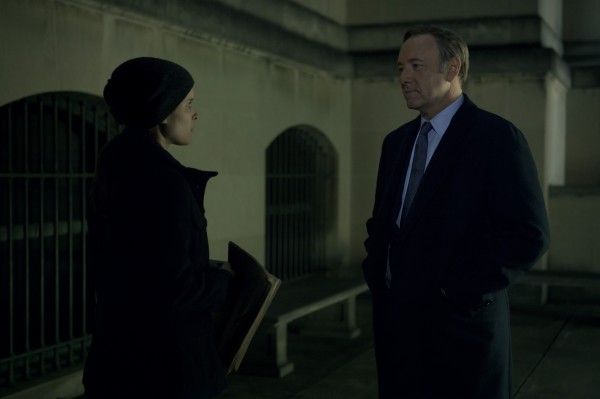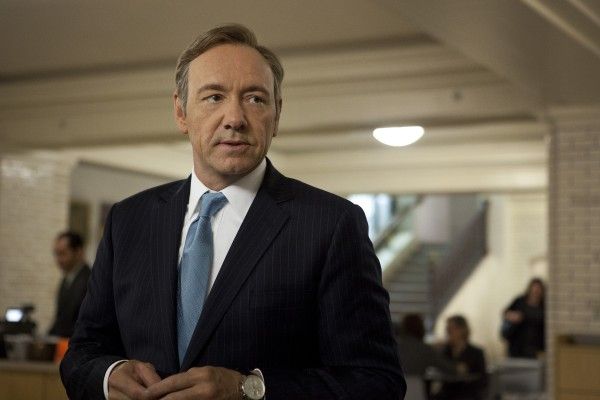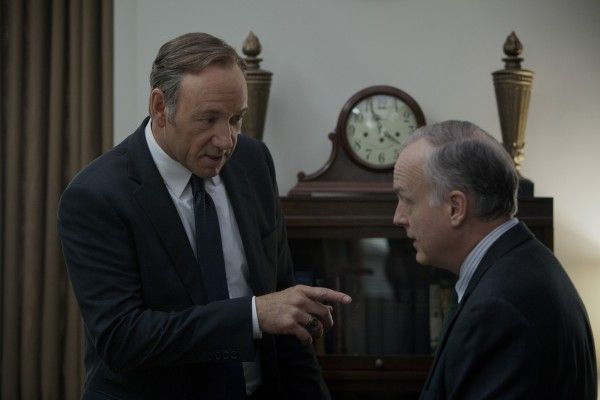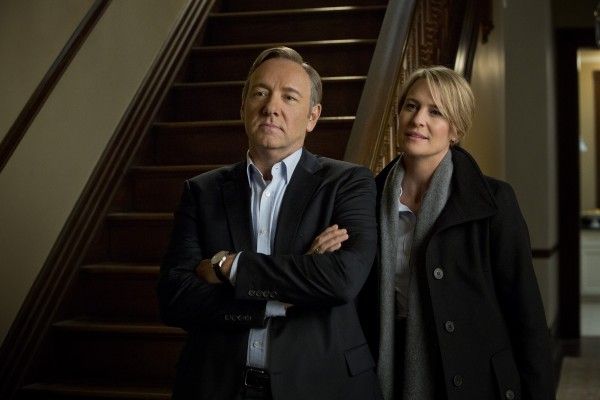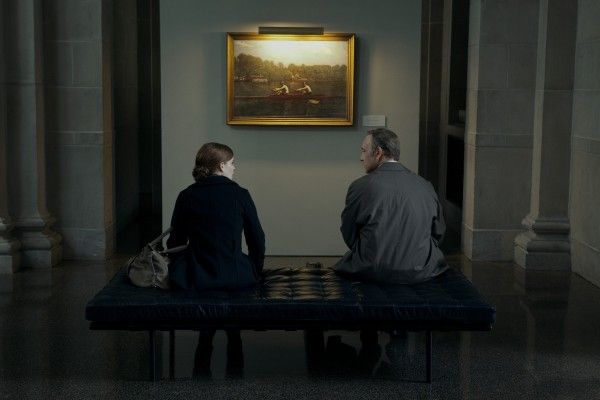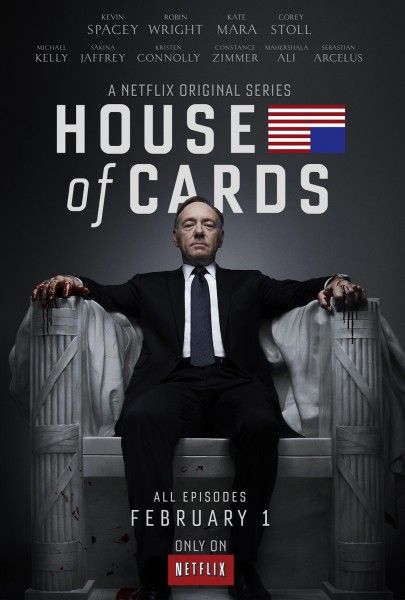This weekend, Netflix premiered House of Cards. All of House of Cards. It was a bold strategy that signaled that not only was Netflix now in the television business (even though it isn't their first original series), but that they had quality programming on the level of HBO. House of Cards is a show with the same level of plotting, character development, twists, and turns that we've come to expect from the celebrated premium channel. In some ways, House of Cards is even better than some of HBO's recent offerings. Beau Willimon's adaptation of the BBC series is radical not only in its distribution, but also in how it spits in the face of those who claim that they need characters to "root for".
House of Cards jumps between four plotlines that orbit around lead character Frank Underwood (Kevin Spacey). Underwood is a callous, craven Democratic congressman and the House Majority Whip, and his tentacles wrap around the corrupt dealings of Washington, D.C. His wife Claire (Robin Wright) is as cold-hearted as her husband, but she wraps herself in her charitable organization, the Clean Water Initiative. The story also features ambitious and ethically-bankrupt Washington Herald reporter Zoe Barnes (Kate Mara) as well as debauched congressman Peter Russo (Corey Stoll) and his loving but frustrated assistant/girlfriend Christina (Kristen Connolly).
The show begins brilliantly as we're introduced to the excellent storytelling device of Frank speaking directly to the camera, and giving us insight into his thought process. Some may see it as too direct, but it makes us complicit in Frank's actions. We're trapped with our horrible yet alluring confidant who tells us up front that there are two kinds of pain: the pain that can make people stronger and the pain that feeds weakness. He tells us he has no patience for the latter, and then proceeds to kill a dying dog.
At the outset of the story, Frank believes he's in line to be Secretary of State as a reward for his work in paving the way for the new President. His expectations are dashed when he's denied the job, and so he sets about making his next move. "Revenge" is far too simple for Frank because revenge is in the moment. What Frank craves more than anything, even more than money, is power and power for power's sake. There isn't a shred of idealism in Frank Underwood. He has no beliefs, and no cause to make the world a better place (making him a Democrat was a smart move since it shatters any accusations of Hollywood's typical bashing of conservatives). Even when his master plan encounters an obstacle, Frank knows how to steer the situation back to his advantage.
The closest cousin to House of Cards is the traditional HBO drama where we're introduced to a massive cast in a highly-detailed and fascinating world. But whereas HBO will drop you into the deep end and force you to sink or swim, Willimon carefully lays out his four plotlines, and then lets them intersect at a methodical yet captivating pace. It's a tone that fits in perfectly with Frank's demeanor: even when he's out of control, he's in control. Willimon almost makes Frank invulnerable, but we see how Frank's belief in that invulnerability is the character's greatest weakness.
House of Cards is delightfully nasty, and is a perfect example of how a story can be compelling without "likable" characters. The closest House of Cards ever comes to a sympathetic figure is Russo, and even he is a deeply flawed, selfish, and weak man. Through Frank's lens, even "noble" characters are sad little pawns. Early in the season, Frank manipulates a potential Secretary of Education by playing on his "good nature." In the scene, Frank turns to the camera and says something along the lines of "It's easy to predict a martyr. All you need to do is sharpen the sword and let them fall on it."
Frank's asides to the camera are wonderful, and feature the best dialogue in the series, so we're constantly counting down to the next time he speaks to us. Even though Frank is being brutally honest with us, we're as easily manipulated as everyone in the show because we crave his attention. Willimon and his writers have crafted some truly memorable lines like when Frank tells us about his relationship to Claire by saying, "I love her more than sharks love blood." When Frank's asides go on even longer, House of Cards almost takes on a Shakespearean quality like Iago telling us how he plans to ruin Othello.
We constantly want to return to Frank's orbit not only because of Spacey's incredible performance, but because none of the other storylines can match his power. Everything is ultimately in service of Frank Underwood, and we can become impatient as we wait to see how Claire's ambitions or Peter's weaknesses will ultimately relate back to Frank's plans. House of Cards has an outstanding cast, and they all give terrific performances, but it all comes back to Spacey. Frank Underwood will go down alongside Verbal Kint, Lester Burnham, and John Doe as one of the most memorable characters of his career.
The show also benefits from its expert direction. Executive producer David Fincher hooks us by directing the first two episodes and setting the dark and foreboding tone for the rest of the series. Furthermore, every director on the show has at least one feature film credit, and the professionalism of the show gives it a cinematic quality. However, despite all the episodes being released at once, House of Cards never feels like a 13-hour movie. It's episodic television, but with the production quality we've come to expect from a channel like HBO.
Surprisingly, even though the show has an incredible cast, crackerjack dialogue, and powerful directing, House of Cards can be somewhat campy at times. The show has such a big personality and crosses so many plotlines that the requirement to keep the energy at a high level makes certain moments feel almost comical. There are points where we feel that Frank is not only smart, but his opponents, including the President and his Chief of Staff, are exceedingly stupid.
Ultimately, these are minor bumps in the road on a show that can drop your jaw when it chooses to unleash the full force of Frank's power. Releasing all 13 episodes is perfectly fitting for a show like House of Cards. A week-by-week release would let us acclimate, and give us time to tease out the characters' next moves. The show gets us addicted in the first two episodes, and then we're trapped along for the ride. We're up until 3:00am because we need to know what happens next. House of Cards makes us invested in its characters, right down to their rotten, cynical cores.
Rating: B+
Click here for my editorial on how Netflix and House of Cards are part of the changing landscape of modern TV viewing habits.


